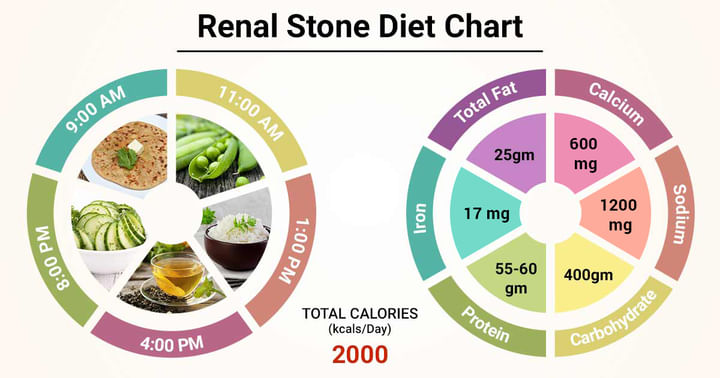Diet Chart For renal stone
Last Updated: Jan 20, 2025
About
There can be two objectives in taking the renal stone diet. One objective is to prevent renal stones. Patients with kidney stones have a fifty percent chance of developing another within five to seven years of their episode. To prevent recurrence or development of kidney stones in the first place, a strict diet must be followed. The second objective is to aid treatment of the renal stone that is lodged in the patient’s urinary system. Renal stones are formed when chemicals in the urine become accumulated to form crystals. The crystals grow larger and form stones in the urinary system. A renal stone may pass out of the body through the urethra. Sometimes they get stuck somewhere along the way and block the passage of urethra. This is when they cause pain. Kidney stones are mostly made of calcium oxalate, calcium phosphate, uric acid, struvite, and cysteine. For prevention of kidney stones, one should drink plenty of fluids, especially water. One should aim to drink at least two and a half to three liters of water. People with cystine stones should aim for four liters of water. Limit the intake of sugary aerated drinks and sodium in the diet to prevent renal stones. Choose to consume fresh fruits and vegetable, nuts over packaged foods for balanced sodium intake.
Diet Chart
| Sunday | |
| Breakfast (8:00-8:30AM) | 2 paratha(aloo/gobhi/methi) with 2 tsp green chutney+1 glass milk(toned) |
| Mid-Meal (11:00-11:30AM) | 1 medium size pea |
| Lunch (2:00-2:30PM) | 1 cup rice+2 roti+brinjal sabji+1/2 cup rasam+1 glass buttermilk |
| Evening (4:00-4:30PM) | 1 cup green tea+2-3 biscuits |
| Dinner (8:00-8:30PM) | 3 bajra roti+lauki methi curry+1/2 cup cucumber salad |
| Monday | |
| Breakfast (8:00-8:30AM) | 3 uthappam+2tsp methi chutney+1 glass milk(toned) |
| Mid-Meal (11:00-11:30AM) | 100gm musk melon |
| Lunch (2:00-2:30PM) | 4 jowar roti+ 1/2 cup bitter gourd sabji+1/2 cup french beans curry+1 glass buttermilk |
| Evening (4:00-4:30PM) | 1 cup green tea+2-3 biscuits |
| Dinner (8:00-8:30PM) | 3 roti+1/2 cup colocasia(arbi) curry+1/2 cup cucumber salad |
| Tuesday | |
| Breakfast (8:00-8:30AM) | 1 cup bajra upma with vegetables+1 glass milk(toned) |
| Mid-Meal (11:00-11:30AM) | 100gm pomegranate |
| Lunch (2:00-2:30PM) | 1 cup rice+2 roti+1/2 cup rasam+1/2 cup capsicum sabji |
| Evening (4:00-4:30PM) | 1 cup green tea+2-3 biscuits |
| Dinner (8:00-8:30PM) | 3 jowar roti+1/2 cup raw banana curry+1/2 cup cucumber salad |
| Wednesday | |
| Breakfast (8:00-8:30AM) | Vegetable sandwich with 4 whole wheat bread slices+cucumber,tomato, onion,spinach/lettuce+1 glass milk(toned) |
| Mid-Meal (11:00-11:30AM) | 100 gm of pineapple |
| Lunch (2:00-2:30PM) | 1 cup rice+2 roti+1/2 cup rasam+1/2 cup ivy gourd(parmal) sabji+1 glass buttermilk |
| Evening (4:00-4:30PM) | 1 cup green tea+2-3 biscuits |
| Dinner (8:00-8:30PM) | 3 roti+1/2 cup tinda curry+ 1/2 cup cucumber salad |
| Thursday | |
| Breakfast (8:00-8:30AM) | 3 rice dosa+1/2 cup sambhar(less dal)+1tsp methi chutney+1 glass milk(toned) |
| Mid-Meal (11:00-11:30AM) | 1 banana |
| Lunch (2:00-2:30PM) | 4 bajra roti+1/2 cup methi sabji +1/2 cup mooli curry+1 glass buttermilk |
| Evening (4:00-4:30PM) | 1 cup green tea+2-3 biscuits |
| Dinner (8:00-8:30PM) | 3 bajra roti+ 1/2 cup ridge gourd(thori) curry+1/2 cup cucumber salad |
| Friday | |
| Breakfast (8:00-8:30AM) | 4 rice Idly+ 1/2 cup sambhar(less dal)+1 tsp coconut chutney+1 glass milk(toned) |
| Mid-Meal (11:00-11:30AM) | 1 medium size orange |
| Lunch (2:00-2:30PM) | 1 cup rice+2 roti+1/2 cup rasam+1/2 cup cabbage sabji+1 glass buttermilk |
| Evening (4:00-4:30PM) | 1 cup green tea+2-3 biscuits |
| Dinner (8:00-8:30PM) | 3 roti+1/2 cup bhindi curry+1/2 cup cucumber salad |
| Saturday | |
| Breakfast (8:00-8:30AM) | 1/2 cup cornflakes in 1 glass milk(toned) |
| Mid-Meal (11:00-11:30AM) | 1 medium size guava |
| Lunch (2:00-2:30PM) | 1 cup rice+2 roti+1/2 cup snake gourd sabji+1/2 cup rasam+1 glass buttermilk |
| Evening (4:00-4:30PM) | 1 cup green tea+2-3 biscuits |
| Dinner (8:00-8:30PM) | 3 jowar roti+1/2 cup cauliflower curry + 1 cup cucumber salad |
Food Items To Limit
- Limit Animal Protein: Foods highest in purines include organ meats, such as liver, heart and kidney; anchovies; sardines; mackerel; codfish; herring; mussels; scallops; shrimp; veal; bacon.
- Avoid Sodium: Sodium may increase your risk of calcium oxalate and phosphate stones by causing your kidneys to excrete more calcium in the urine.
- Avoid Oxalate & Vitamin C: Limit the oxalate in your diet if you are at risk for calcium oxalate stones. Foods high in oxalate can increase levels in the urine. High-oxalate foods include spinach, beets, rhubarb, nuts, wheat bran, buckwheat and chocolate.
- Stone Promoting Fluids: Avoid sodas altogether to help reduce recurrence of stones. Drink mostly water and aim to consume between eight to 12 cups of fluid per day to help prevent all types of kidney stones.
- Foods High in Potassium: Kidney patients are advised to limit foods that are high in potassium, as these may lead to life-threatening complications such as heart failure. Tomato, potato, spinach, avocados, banana, orange and dried fruits should be limited.
- Caffeine and Alcohol: You need to limit caffeine and alcohol. Alcoholic and caffeinated beverages may initially increase urine output, but deplete your body water.
Do's And Dont's
Do's:
- Drink sufficient water/juices to excrete more than
- 5-2 liters of urine per day.
- Reduce consumption of protein food to a judicious level, as diet high in protein (e.g., meat fish, pulses, nuts and eggs) may lead to kidney stones.
- Decrease the consumption of sugar (e.g., sucrose)as sugar also promotes stone formation.
- Consume adequate amount of calcium every day. You can get enough calcium from food items like milk (120mg/100g), yogurt (120 mg/100g) and cheese (700mg/100g) reducing calcium intake may not decrease risk of stone formation but can lead to osteopenia. Moreover, reduced calcium consumption increases oxalate stone formation.
- Daily consume raw fruits such as melons, papaya, grapes, bananas, etc. in large quantity as they provide water soluble fiber.
- Be active and exercise regularly to lose your weight, which may be helpful to flush out better and maintain healthy functioning kidneys.
Don'ts:
- Avoid drinking a lot of coffee/tea and alcoholic beverages.
- Avoid too much drinking of carbonated drinks, sports drinks and sodas etc.
- Avoid highly salted (e.g., canned food, ready to eat food snacks, etc.) or sugared foods. High salt intake increases the level of calcium in urine and hence increases the risk of stone formation. This risk increases with the combination of high salt and high protein foods.
- Avoid oxalate containing foods including nuts, black tea, green leafy vegetables, soya and chocolates.
Food Items You Can Easily Consume
- Cereals: Brown rice, Oat meal, Brocken wheat, Ragi, Quinoa.
- Pulses: Chickpeas, Kidney beans, moong dal, masoor dal, soybeans.
- Vegetables: All gourds-bitter gourd, snake gourd, ridge gourd, bottle gourd, ivy gourd, ladies finger, tinda,green leafy vegetables.
- Fruits: Custard Apple, Pears, Grape and Watermelon, Orenges and Apple.
- Milk and Milk products: Skim milk, Paneer, Cotage Cheese, Yoghurt.
- Meat, Fish and Egg: Lean Meat, skin out chicken, Tuna, Salmon.
- Oil:
- 5 Tbsp/ day( Olive oil, Mustard Oil, Rice bran Oil, Canola oil
- Sugar: 1 Tsp/ day.
References
- Heilberg IP. Update on dietary recommendations and medical treatment of renal stone disease. Nephrology Dialysis Transplantation. 2000 Jan 1;15(1):117-23.
- Trinchieri A. Diet and renal stone formation. Minerva medica. 2013 Feb;104(1):41-54.
- Trinchieri A, Mandressi A, Luongo P, Longo G, Pisani E. The influence of diet on urinary risk factors for stones in healthy subjects and idiopathic renal calcium stone formers. British journal of urology. 1991 Mar;67(3):230-6.
Table of content
Find Dietitian/Nutritionist near me
Ask a free question
Get FREE multiple opinions from Doctors



